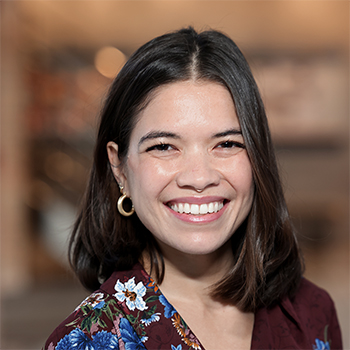Personal Pronouns
she/her/hers
Primary Website
Education
- PhD in Civil Engineering, Stanford University, 2021
- MS in Sustainable Design & Construction, Stanford University, 2018
- BS in Civil Engineering, The Ohio State University, 2016
Research Interests
My research surrounds the development of disaster information that centers users and the human experience. My group applies geospatial modeling, risk analysis, and user-centered design techniques to develop tools that inform effective and equitable disaster risk reduction and recovery. Through the lens of data, our work bridges engineering with earth and social sciences to prioritize vulnerable communities both domestically and in the Global South.
- Disaster risk, recovery, and resilience
- Equity and environmental/disaster justice
- Data analytics and statistical inference
- Statistical learning and predictive modeling
- Geostatistics and geospatial modeling
- Qualitative and community based research
- User centered design
Professional Service
- Co-chair of the Natural Hazards Center Annual Researchers Meeting
- Co-founder of the Risk & Resilience DAT/Artathon
- Core member of the Environmental Justice Task Force for the U.S. Geological Survey
- Research affiliate at the Natural Hazards Center at University of Colorado Boulder
- Guest editor for Natural Hazards and Earth System Sciences and the International Journal of Mass Emergencies and Disasters
Publications
For a full list of publications, please see my Google Scholar page
- Loos, S., Lallemant, D., Khan, F., McCaughey, J. W., Banick, R., Budhathoki, N., & Baker, J. W. (2023). A data-driven approach to rapidly estimate recovery potential to go beyond building damage after disasters. Communications Earth & Environment, 4(1), Article 1. https://doi.org/10.1038/s43247-023-00699-4
- Loos, S., Levitt, J., Tomozawa, K., Baker, J., & Lallemant, D. (2022). Efficacy of Damage Data Integration: A Comparative Analysis of Four Major Earthquakes. Natural Hazards Review, 23(4), 04022026. https://doi.org/10.1061/(ASCE)NH.1527-6996.0000581
- Loos, S., Lallemant, D., Baker, J., McCaughey, J., Yun, S.-H., Budhathoki, N., Khan, F., & Singh, R. (2020). G-DIF: A geospatial data integration framework to rapidly estimate post-earthquake damage. Earthquake Spectra, 36(4), 1695–1718. https://doi.org/10.1177/8755293020926190
- Lallemant, D., Loos, S., McCaughey, J. W., Budhathoki, N., & Khan, F. (2020). Informatics for Equitable Recovery: Supporting equitable disaster recovery through mapping and integration of social vulnerability into post-disaster impact assessments (pp. 1–51) [Report]. Nanyang Technological University. https://doi.org/10.32656/ier_final_report_2020
- Bhattacharjee, G., Soden, R., Barns, K., Loos, S., & Lallemant, D. (2021). Factors affecting earthquake responders’ building damage information needs and use. Earthquake Spectra, 87552930211030300. https://doi.org/10.1177/87552930211030297
- Lallemant, D., Soden, R., Rubinyi, S., Loos, S., Barns, K., & Bhattacharjee, G. (2017). Post-Disaster Damage Assessments as Catalysts for Recovery: A Look at Assessments Conducted in the Wake of the 2015 Gorkha, Nepal, Earthquake. Earthquake Spectra, 33(1_suppl), 435–451. https://doi.org/10.1193/120316EQS222M
Awards
- President’s Service Award, International Research Committee on the Sociology of Disasters from the International Sociological Association (ISA RC-39), 2023
- Mendenhall Research Fellow, U.S. Geological Survey and Natural Hazards Center at University of Colorado Boulder, 2021-2023
- U.S. Geological Survey STAR Award, 2022
- John A. Blume Fellowship in Earthquake Engineering, 2021
- Best Graduate Student Paper Award, Earthquake Engineering Research Institute, 2020
- Best Visual Design, World Bank & Mapbox VizRisk Challenge, 2019
- NSF Graduate Research Fellowship, 2016-2019
